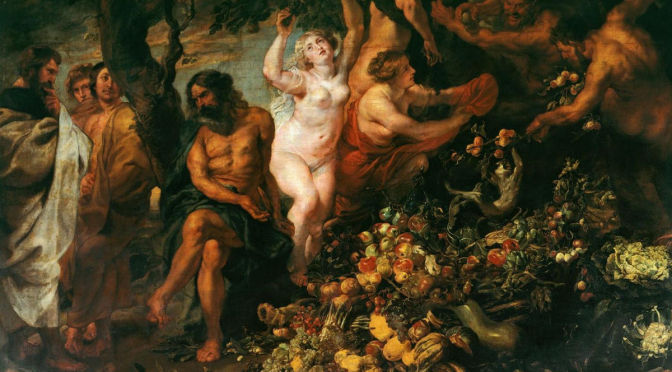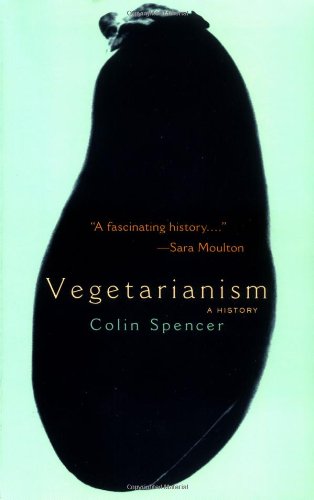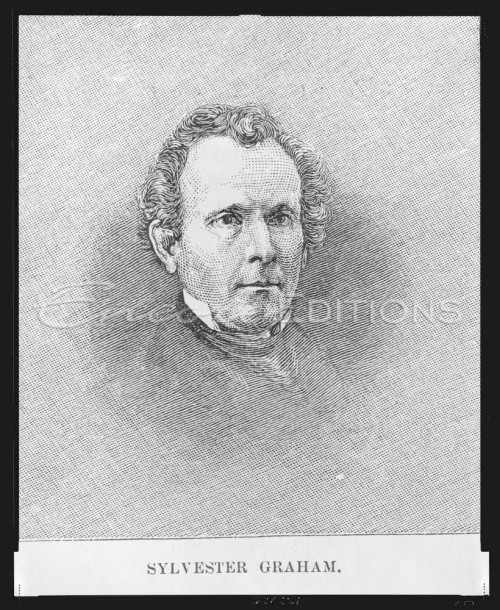wegetarianizm
Dieta pitagorejska termin
Dieta pitagorejska 1)↓ oficjalnie zmieniła nazwę na wegetarianizm w 1847 roku, podczas spotkania w Northwood Villa, Ramsgate, w Anglii, w hydropatycznym sanatorium prowadzonym przez Williama Horsella, w którym narodziło się Stowarzyszenie Wegetarian (Vegetarian Society). Była to odpowiedź Horsela, wydawcy magazynu zatytułowanego The Truth Tester (Miernik Prawdy), na list od wegetariańskiego czytelnika sugerującego, że takie stowarzyszenie powinno zostać powołane.
Termin „wegetariański” był znany i pojawiał się latach czterdziestych dziewiętnastego wieku, lecz nabrał oficjalnej wagi wraz z narodzinami stowarzyszenia. Później, przyszły prezydent stowarzyszenia, profesor Mayor mówił, że nazwa wywodzi się z łacińskiego vegetus, znaczy „żywy i pełen wigoru”. To etymologiczne wyjaśnienie nie wydawało się wystarczająco przekonujące, bo od samego początku wegetarianin zdawał się określać kogoś pasywnego i spokojnego, z powodu takich postaci jak Tołstoj i Shaw, którzy odcisnęli swój wyraźny charakter na publicznej percepcji zjawiska i rozumieniu terminu.
Colin Spencer Vegetarianism: A History
| 1. | ↑ | Nazwa [dieta pitagorejska] określająca sposób bezmięsnego odżywiania była używana w obrębie morza Śródziemnego i w Europie aż do połowy XIX wieku; używano jej w chrześcijańskiej średniowiecznej Europie, wtedy była zazwyczaj synonimem nadużycia, występku i herezji. Później dla odmiany poeta Shelley określał nią idealny sposób życia. Dieta pitagorejska znaczyła zasadniczo unikanie mięsa zabijanych zwierząt, lecz brakowało w tym terminie precyzji. Oryginalnie dieta ta mogła być wegańska – co sugerują niektóre źródła na temat diety Pitagorasa – lecz historycznie wiadomo że dieta ta zawierała często nabiał i mogła również obejmować ryby. Historyczne zapisy co do składników niektórych diet i posiłków nie są dokładne – dają zaledwie ich blade wyobrażenie. |

Sylvester Graham from "Vegetarianism: A History"
Sylvester Graham (1794-1851), who was an earnest advocate of the health regimen (similar to the Alcott House routine) of temperance and vegetarianism. He was a major force of the times. He was ordained a minister in 1826 and lectured widely on his subjects with particular emphasis on the use of wholemeal wheat flour in bread and baking. His health plan was Spartan – hard mattresses and cold showers and a vegetarian diet with home-baked bread. Graham was a believer in consuming as great a proportion of`raw’ food as possible. His theory was that we should eat what Adam and Eve ate before the Fall. Great emphasis, therefore, was placed on berries, nuts, seeds and fruit. He maintained that to give the best health food should be uncooked, undressed, unprocessed and unrefined. It is astonishing that Graham’s imprint in wholemeal flours and breads is so clearly seen still today in bakers’ and health food shops throughout the country 1)↓.
from „Vegetarianism: A History” by Colin Spencer
| 1. | ↑ | and that in the USA wholemeal flour is referred to still as Graham flour… [w Polsce chleb z ciemnej mąki też ciągle nazywany jest grahamem…- przyp – Amin] |
anarchic aspect of vegetarianism
Not to eat meat, or to frown on the captivity and killing of animals, went to the heart of society…
It is not difficult to see how the man who collected the largest herds would become the most influential and most powerful in the community. One can also see how, in a community structured around the number of cattle owned by its inhabitants, the idea that their meat was unnecessary to human survival would seem heretical – it would be not simply a criticism of meat-eating but a criticism of power. Power itself would also come to mean moral worth and therefore to deserve reverence. Not to eat meat, or to frown on the captivity and killing of animals, went to the heart of society.
…vegetarianism becomes inevitably a lifestyle which at times is impossible to keep private. Such views may seem quite harmless to the ruling classes and the whole apparatus of statecraft, yet the lifestyle is an unspoken criticism. But, more than that, vegetarianism is one of the signs of a radical thinker, the individual who criticises the status quo, who desires something better, more humane and more civilised for the whole of society. It makes meat-eaters uneasy and they often react aggressively.
from „Vegetarianism: A History” by Colin Spencer

i am a sandal-wearer
„One sometimes gets impression that the mere words ‚Socialism’ and ‚Communisim’ draw towards them with magnetic force every fruit-juice drinker, nudist, sandal-wearer, sex maniac, Quaker, ‚Nature Cure’ quack, pacifist, and feminist…”
George Orwell from Vegetarianism: A History by Colin Spencer
Ancient Greek Diet from "Vegetarianism: A History"
The Greeks of the Golden Age are only forty-eight generations ago; compared to the time human beings have taken to evolve that is a brief second.
When examining food in past cultures we tend only to look at the food of the elite, for that small minority is the one that has left records. However, we should not forget the millions who slaved and worked the soil for their diet is highly informative too. The majority of peoples in the Ancient World were farmers cultivating land which was bordered by wild forest, mountains and sea and these places teemed with life that could be caught and eaten. By the time of the Golden Age much of the forests of Attica had been cut down for ships and the heavy rains of winter now washed the top soil away. Good pasture for livestock grazing was a problem. The majority of people were poor, eating meat only perhaps twice a year at the major festivals, they depended on foods from the wild to flavour and augment their diet. From the wild they ate seeds, lupins are mentioned, nuts and bulbs, iris rhizomes were a favourite and a host of green leaves and herbs. Wild foods were a larder of myriad flavours and textures. It is these foods with their thousands of trace minerals which enriched the diet and which we lack today.
The olive tree, its fruits and oil, was central to the cuisine and agricultural economy of Greece.We cannot now imagine eating a Greek meal without its presence, it was the same then. The audience for the Attic comedies were certainly not farmers, they were all city people, not just the elite, but the tradesmen and shopkeepers, the craftsmen, potters and armourers. So the frequent food references were appreciated by an audience of all classes. They were as food obsessed as we are now.
They loved fish more than any other food. There was a great range eaten, mentioned in the literature are shellfish, tunny, pike and carp, grey mullet, blue fish, catfish, conger eel, dogfish (types of shark), skate, ray, sturgeon and swordfish. Tunny was the most important economically, its route of annual migration known to fishermen since prehistory. It would have been sliced in steaks, fried on iron skillets in olive oil and while cooking be sprinkled with aromatic herbs and cumin. To be served only with a green salad, according to Archestratus. How very contemporary they sound, and so they should; people do not change overmuch, the human condition remains the same and so do our palates, our sense of flavour and good taste. The Greeks of the Golden Age are only forty-eight generations ago; compared to the time human beings have taken to evolve that is a brief second.
from „Vegetarianism: A History” by Colin Spencer

Vegetarianism: A History Colin Spencer
Humans were not kings or lords of everything that moved. The very concept of metempsychosis implies that all creatures are equal.
There can be little doubt then that Pythagorean vegetarianism, through its Orphic influences, also has its roots deep in Ancient Egypt itself.
Certainly Pythagoras’ abstention from meat was stimulated by Zoroaster as well as by the Egyptians.
We know that the Pythagorean diet is ultimately the most healthy one, while the Pythagorean maxim, `know yourself’ has become the foundation stone of modern psychotherapy. There is a case for re-evaluating Pythagoras as the father of western philosphy. […] Much of what we regard as Platonism we find, upon analysis, to be in essence Pythagorean.
Though the desert fathers were undoubtedly vegetarian it was again only because of the struggle of the early Christians for pre-eminence over their own flesh, and not out of any respect for other creatures.
Clement 1)↓, of course, did not believe in the transmigration of souls, so his abstention from meat is based on ascetic rationalism, on the linking of flesh-eating with the stimulation of passion which would disrupt the stability of Christian commitment: `If any righteous man does not burden his soul by the eating of flesh, he has the advantage of a rational motive. `Pythagoras seems to me to have derived his mildness towards irrational animals from the Law’
God’s law required Jew and Christian alike to eat some meat as part of the holy scheme of things. Vegetarian Christians like Clement could only get away with their behaviour on the grounds of pure asceticism. The ethics of non-violence towards animals or metaphysical doctrines on animal souls were never given as reasons for a vegetarian mode of life. To eat a taboo creature was to break the Mosaic law, to sunder all ties with the one living God; hence how much more heinous a crime would it have been for an orthodox Jew to be a vegetarian and refuse to consume any meat from either list. The very act of being vegetarian suggests that Mosaic law is entirely irrelevant, that the vegetarian lives in a state of greater purity and is therefore closer to God than the orthodox Jew by representing the era before the Fall was an heretical idea. The Christian vegetarian was also breaking with these traditions, that holy sanction whereby God provides for humankind out of his munificence. For Christians, it was only acceptable to renounce meat-eating if you called it asceticism and, better still, went off into the desert to practise it.
on animal souls were never given as reasons for a vegetarian mode of life. To eat a taboo creature was to break the Mosaic law, to sunder all ties with the one living God; hence how much more heinous a crime would it have been for an orthodox Jew to be a vegetarian and refuse to consume any meat from either list. The very act of being vegetarian suggests that Mosaic law is entirely irrelevant, that the vegetarian lives in a state of greater purity and is therefore closer to God than the orthodox Jew by representing the era before the Fall was an heretical idea. The Christian vegetarian was also breaking with these traditions, that holy sanction whereby God provides for humankind out of his munificence. For Christians, it was only acceptable to renounce meat-eating if you called it asceticism and, better still, went off into the desert to practise it.
In Manicheanism… Czytaj dalej
| 1. | ↑ | Aleksandryjski -przyp. Amin |



